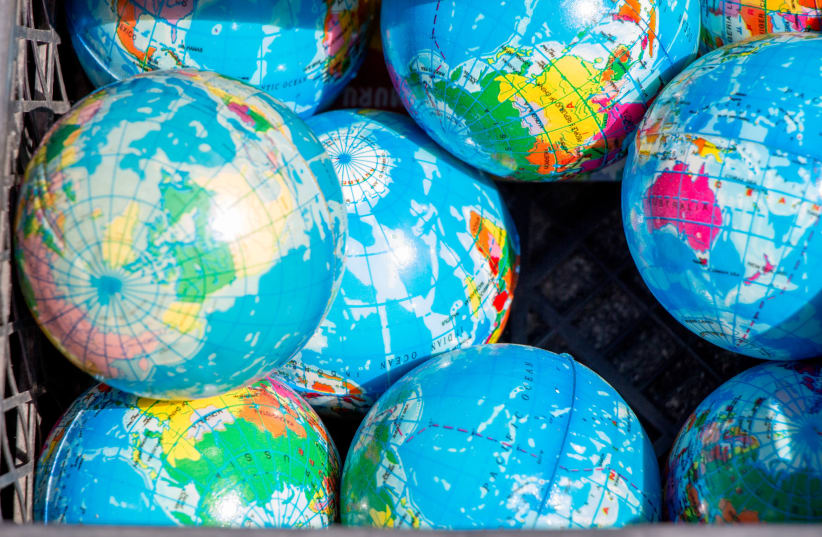Thousands of people worldwide have signed a manifesto designed by the COVID-19 Global Solidarity Coalition and aimed at establishing guidelines, principles and priorities for dealing with the current coronavirus crisis.
“The pandemic has made our global interconnectedness more apparent than ever,” three coalition founders Shenée Simon, David Vine and Peter Kuznick told The Jerusalem Post in an email interview. “What happens to people in Wuhan or anywhere else has the potential to affect people everywhere. People all over the world are feeling the effects of four decades of neoliberal economic policies that have plundered our planet, creating vast fortunes for a few and misery for so many. The current crisis has brought these realities home to people everywhere and made it clear that we need universal solutions to the deep underlying problems confronting our species.”Simon is a researcher and advocate for women, Vine is a professor in the Department of Anthropology at American University and Kuznick is the director of the Nuclear Studies Institute at American University.On Saturday, the group held two launch events via Zoom, Facebook Live and YouTube to share their project with the world and encourage more people to sign the manifesto. The text of the manifesto is in 18 languages.As the pandemic progressed and countries forced their citizens inside, a small team formed an online meeting to create connections and overcome feelings of isolation and helplessness. That group evolved to include individuals from across the globe, including from Lithuania, Peru, South Africa, Spain, as well as Israel and the Palestinian territories.Members come from diverse backgrounds and have no collective affiliation to any political party.“Our sense of humanity helps us defy perceivable barriers across nationality, color, gender, age, language, geographic location and histories of activism,” a joint statement explains on their website. “We share a commitment to envision and create a world of social and economic equality, peace and environmental sustainability – together, and through both small everyday acts and large structural changes.”The manifesto has nine points, including demands for universal health care; an immediate global ceasefire in all conflicts and an end to the disease of war; replacing unsustainable capitalist economies with cooperatively based economies of care; lifting of all sanctions targeting entire nations; protections for essential workers who are fighting the COVID-19 pandemic; protections for the most vulnerable, such as victims of domestic or child abuse; medical aid and debt relief to save lives in countries that lack a strong public health system; governments to respect privacy and not use the pandemic to expand repressive measures such as surveillance; and that governments prioritize the needs of people over the interests of corporate, financial and political elites when providing stimulus programs to reopen the economy.“The COVID pandemic has exposed inequities and injustices that have long been part of our world,” Simon, Vine and Kuznick told the Post. “The dramatic changes to the lives of people around the world and the dramatic and often wrongheaded actions taken by governments show that we, as human beings, must transform our world and make it a more equal, more just and less violent.“We are building a consciously global movement in search of a new paradigm for global security not based on outmoded and untenable hyper-nationalism, militarism, avarice and looting of natural resources, but based upon redistributing wealth and improving healthcare throughout the world, as well as combating climate change, peacefully resolving global conflicts, and ending the existential threat posed by the intensifying nuclear arms race,” they continued. “The coalition’s work and the manifesto build on work many of its members have been pursuing for years and, in some cases, decades in realms including health, racial and gender justice, LGBTQI+ rights, climate justice, peace/anti-war activism and nuclear abolition.”Among the local signees is Ruchama Marton, a long-time icon for the struggle for human rights in Israel and the Palestinian territories. She helped found Physicians for Human Rights, which describes itself on its website as working “to promote a just society where the right to health is granted equally to all people under Israel’s responsibility.”Kuznick lost relatives in the Holocaust. In his personal testament he wrote, “Having grown up in the shadow of the Holocaust, I early on learned to hate racism, prejudice and inequality, and became active in the Civil Rights Movement. The invasion of Vietnam opened my eyes to the global consequences of militarism and imperialism. My involvement in the COVID-19 Global Solidarity Movement is a continuation of my lifelong fight for nuclear abolition, a healthy life-sustaining environment, social equality, wealth redistribution, peaceful resolution of conflicts and realization that what unites us across the planet far exceeds what divides us.”The site also includes a personal testimony by Randa Bassem Serhan, a Palestinian born in Lebanon and raised in Kuwait and Washington, DC.“In this coalition, I found a group of like-minded individuals with commitment to change and mutual respect across language, circumstance, and experience with activism,” Serhan wrote. “In particular, I appreciate that there is a commitment to multiple issues rather than a single issue with lip service to others.”The manifesto can be found at https://diy.rootsaction.org/p/covid.
